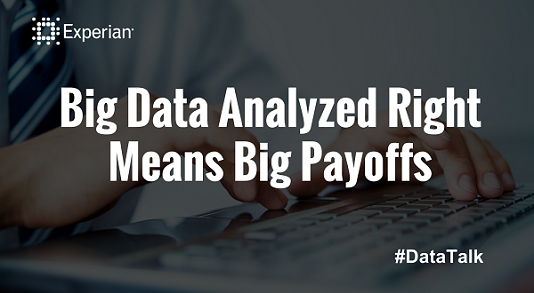Innovation
Insights from our Leaders

 If you were to survey American consumers whether or not they would like to be their own boss and successfully run their own business, I would imagine that a good majority would probably say yes. There is something empowering about the thought of setting your own hours and controlling your own destiny, but many people don’t actually take the steps to make that dream a reality.
If you were to survey American consumers whether or not they would like to be their own boss and successfully run their own business, I would imagine that a good majority would probably say yes. There is something empowering about the thought of setting your own hours and controlling your own destiny, but many people don’t actually take the steps to make that dream a reality.

Today, Experian’s global Fraud and Identity business released its analysis of client transaction data from the 2014 holiday season, showing an 80 percent reduction in the number of manual reviews among online merchants using the company’s fraud and identity products and services compared with the industry average. These results and other observations indicate that a customer-centric approach to fraud prevention would be more effective for many online merchants, leading the company to recommend five best practices for online merchants preparing for the 2015 holiday season.

 Health information security breaches and identity theft have become an epidemic with losses occurring across the country.
In fact, according to a recent Ponemon Institute study sponsored by the Medical Identity Fraud Alliance, medical ID theft has increased by 21.7 percent since 2013. Additionally, data from the Department of Health and Human Services indicates that health data on more than 120 million people has been compromised in more than 1,100 separate breaches since 2009.
Health information security breaches and identity theft have become an epidemic with losses occurring across the country.
In fact, according to a recent Ponemon Institute study sponsored by the Medical Identity Fraud Alliance, medical ID theft has increased by 21.7 percent since 2013. Additionally, data from the Department of Health and Human Services indicates that health data on more than 120 million people has been compromised in more than 1,100 separate breaches since 2009.

 With rising insurance costs, deductibles and copays, some people struggle to afford the out-of-pocket expense that can come with seeking medical treatment. Because of this, some consumers decide not to seek treatment, which could have negative effects on their health and overall well-being.
With rising insurance costs, deductibles and copays, some people struggle to afford the out-of-pocket expense that can come with seeking medical treatment. Because of this, some consumers decide not to seek treatment, which could have negative effects on their health and overall well-being.

 Nowadays, whenever you hear news about the automotive industry, a negative tone tends to pop up. Whether it’s the increase in lending to subprime consumers, or the lengthening in loan terms, the stories lead one to believe that the industry is headed toward another “bubble.”
However, that’s not necessarily the case. When we look at the data, the automotive finance market actually demonstrates a strong industry as a whole.
Nowadays, whenever you hear news about the automotive industry, a negative tone tends to pop up. Whether it’s the increase in lending to subprime consumers, or the lengthening in loan terms, the stories lead one to believe that the industry is headed toward another “bubble.”
However, that’s not necessarily the case. When we look at the data, the automotive finance market actually demonstrates a strong industry as a whole.

 The term big data tends to be overused in business today. While some refer to it as a technology and others a level of insight, it has come to embody many different data actions, from business intelligence, to analytics and data modelling.
We have become so obsessed with big data that we think we have to have this level of insight as a requirement to running a successful business.
The term big data tends to be overused in business today. While some refer to it as a technology and others a level of insight, it has come to embody many different data actions, from business intelligence, to analytics and data modelling.
We have become so obsessed with big data that we think we have to have this level of insight as a requirement to running a successful business.

 Every time I turn on my television, look out my window or drive into the office, I always see hybrid or electric vehicles on the road. These days it seems like almost everyone is going green.
Every time I turn on my television, look out my window or drive into the office, I always see hybrid or electric vehicles on the road. These days it seems like almost everyone is going green.

 People are making a big deal about big data—and it is a big deal.
It has the power to guide us in addressing some of our nation’s most pressing needs, from protecting against fraud at the checkout counter to helping families secure affordable loans that help them accomplish their dreams. And like any powerful tool, it must be deployed wisely; in the wrong hands, as Hollywood saw recently, data can be hacked.
People are making a big deal about big data—and it is a big deal.
It has the power to guide us in addressing some of our nation’s most pressing needs, from protecting against fraud at the checkout counter to helping families secure affordable loans that help them accomplish their dreams. And like any powerful tool, it must be deployed wisely; in the wrong hands, as Hollywood saw recently, data can be hacked.

At Experian we believe that data is good. Good for our economy, good for consumers and good for society. Analytics and technology designed to help marketers put their data to use and become truly customer-centric is just one example of using data as a force for good. The following column was written by Emad Georgy, senior vice president of development and global head of development at Experian Marketing Services, as part of a “Data-Driven Thinking” series for AdExchanger.